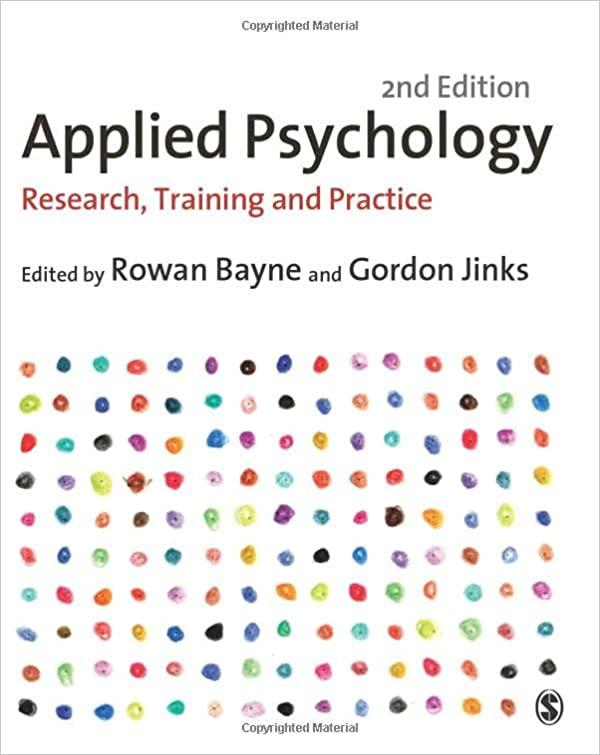Question
Here is a background of Sheldon Cooper:Sheldon Cooper is a Caltech theoretical physicist who shares an apartment with his colleague and best friend, Leonard Hofstadter.
Here is a background of Sheldon Cooper:Sheldon Cooper is a Caltech theoretical physicist who shares an apartment with his colleague and best friend, Leonard Hofstadter. Originally from East Texas, Sheldon started college at the age of 11, receiving his first Ph.D. at the age of 16. Sheldon was involved in numerous experiments as a child genius, such as his plan to provide free electricity for his hometown by building a nuclear reactor - a plan stopped by the government due to irresponsible storage of uranium. Sheldon claims to be the perfect human specimen and feels that the world does not give realize Sheldon's full potential. Sheldon is characterized by a strict adherence to routine, such as questioning Leonard on how regular he is; an overly intellectual personality; a lack of understanding of irony, sarcasm and humor; and a general lack of humility or empathy, the former of which is demonstrated in the fact that he has no problem voicing to his peers his admiration for his superior intellect. While Sheldon lacks these qualities, he does attempt to gain a better grasp of empathy and understanding humor and sarcasm.
History
Sheldon was born in Galveston, Texas to Mary Cooper, and was born at the Lawrence Memorial Hospital in 1980. His father, George Cooper, died during Sheldon's childhood. He has a twin sister named Missy and an older brother named George. Sheldon was raised according to his mother's Evangelical Christian beliefs. Meanwhile, he was forced to watch football by his father.
Sheldon was bullied a lot during his childhood, mostly because he constantly expressed intellectual superiority to his peers (as he does now.) While in grade school, Sheldon wrote papers entitled "A Proof That Algebraic Topology Can Never Have a Non-Self-Contradictory Set of Abelian Groups" and "A Rederivation of Maxwell's Equations Regarding Electromagnetism".
Sheldon entered college at the age of eleven, right after completing the fifth grade. When Sheldon was fourteen years old, he graduated college summa cum laude, began graduate school, and was the youngest person at the time to receive the Stevenson Award at "fourteen and a half." He received his first doctorate at the age of sixteen and he then spent four years on his second dissertation, before obtaining his current job.
Abnormal behaviors
Sheldon appears to have problems understanding societal laws at times. He has dropped objects out his window into traffic without any regard, in addition to breaking into buildings. He has also gone to various places, such as a kid's play-area, and even began working at the Cheesecake Factory without being granted permission. He has expertise with picking locks and disarming alarm systems. Furthermore, the Department of Homeland Security notifies his mother when he acts contrary to federal law. Homeland Security is familiar with him, and instead of arresting Sheldon after committing potential crimes, simply inform his mother and let her deal with him
The most notable feature of Sheldon's personality is his refusal to sit anywhere other than his designated spot on the far left cushion of the couch in his apartment, which he considers the perfect location in the apartment. Sheldon regularly reproaches Penny and other people for sitting in his spot. Even disruptions to this location are enough to disturb him, although he did allow Penny to sit in his spot on one occasion. As well as his designated spot in the apartment, if Sheldon is ever in a different area where he is going to sit down, such as Penny's apartment, he has to choose the best sitting location based on such things as optimal television viewing, lighting, airflow, and cushion density.
Based on this, answer the following questions with examples from the text above and what would be an example of four page paper.
The following questions are:
1. After reading the case study, would you diagnose Sheldon with a DSM disorder? If so, which disorder? What is your support for the diagnosis?
2. What disorder(s) would you rule out? In other words, what disorder(s) does Sheldon show symptoms of, but would he not qualify for a diagnosis?
3. According to the case study, what factors may have played a role in the development or maintenance of Sheldon's symptoms?
4. What treatment would you recommend for Sheldon's diagnosis? What symptoms should be targeted first?
5. Are there any situations in which Sheldon's symptoms might actually be beneficial to his functioning?
Step by Step Solution
There are 3 Steps involved in it
Step: 1

Get Instant Access to Expert-Tailored Solutions
See step-by-step solutions with expert insights and AI powered tools for academic success
Step: 2

Step: 3

Ace Your Homework with AI
Get the answers you need in no time with our AI-driven, step-by-step assistance
Get Started


